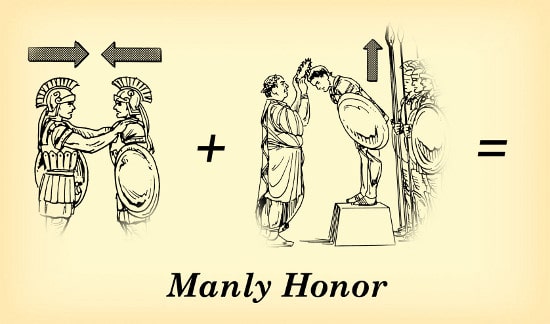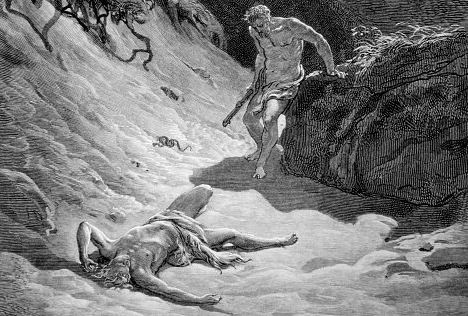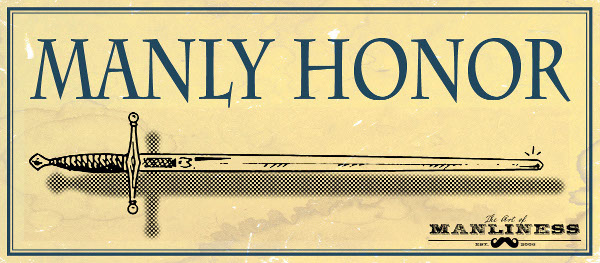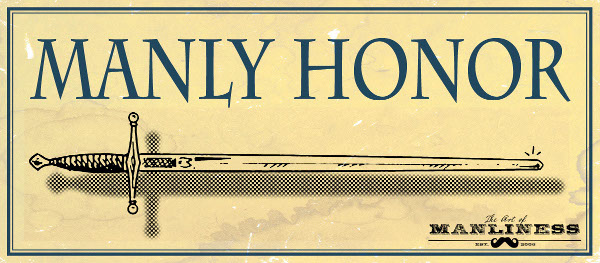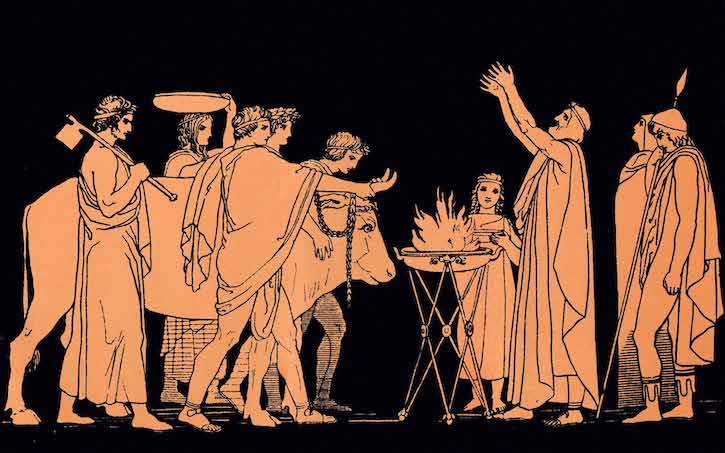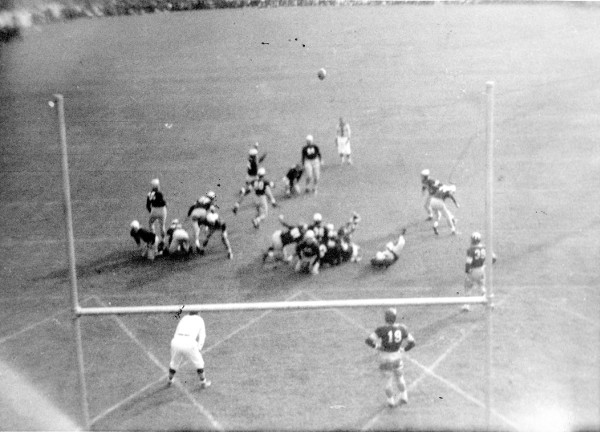
When I’m reading about the life of Theodore Roosevelt – writer, soldier, president, explorer – I’m amazed at how much more manly he was than I am, and how much more he did with his life than I’ll ever do with mine.
There are also modern men that knock my manliness down a peg. Take a guy like Sam Sheridan, author of A Fighter’s Heart and The Fighter’s Mind. Here’s how the “About” page on his website reads:
“I grew up in Western Massachusetts, the son of educators. My mother is an artist, a writer and a teacher, and my father is an ex-Navy Seal and the business manager of a New England prep school, Deerfield Academy (now retired). I learned to sail at an early age, as my father was an avid sailor who would move yachts for other people up and down the coast.
I went to Deerfield, which was a coat-and-tie prep school, and then went into the Merchant Marines, where I worked as a Steward Assistant (the lowest low-life, washing dishes) on the USNS Able. I spent about a year onboard her, mostly operating out of Norfolk, VA. Then I quit and spent some time traveling Europe.
I went to Harvard and majored in art (Visual and Environmental Studies). I spent my junior year at the Slade School in London, in a prestigious Studio Art program and I sort of “became” a painter at that point. I worked a summer on the largest cattle ranch in Montana, mostly driving tractors but some cowboy work.
Immediately after I graduated I took a job on the private sailing yacht Wireless, an ’85 Don Brooks ketch, as First Mate. After about a five month re-fit in Florida and Newport, RI, I was with her for a charter season in the Caribbean. I stayed on that yacht through 3 different captains, about 5 stewardesses and a variety of guests and engineers. We took her through the Panama Canal and on the “Milk Run” through the South Pacific. I was with her for a year and a half, all the way to Australia.
I got off and went to Thailand, where I lived in a Muay Thai camp and fought, featured on National Geographic’s “A Fighting Chance.” After my fight, my visa ran out so I rejoined a friend in Australia, and sailed from Darwin, Australia to Durban, South Africa on yacht Pamela, a ’38 Hans Christian. Again I quit the boat and wandered around South Africa for awhile.
After some time there I came home and temped in Boston until got a job doing construction in Antarctica for Raytheon. I met a smokejumper at the South Pole Station who got me into Wildland Firefighting and I fought fire the next two seasons in Washington State with the Ahtanum 20 and all over the West with the Gila Hotshots (as an EMT), and I helped a friend bring a yacht back from Mallorca (Spain) to Antigua (Carib.) on yacht Mustang after the season ended. I continue to do yacht deliveries and have been writing books for the last four years.”
Holy crap. Sheridan is like a real-life Most Interesting Man in the World. It’s enough to make me feel, as TR would put it, like “an emasculated mass of inanity.”
I’m even super unmanly when compared to my next of kin. My dad was a federal game warden and spent each fall going into the wilderness to confront men who had guns (and who were oftentimes under the influence of alcohol) about violating the Migratory Bird Act. His father was a miner, and my great-great-grandfather was a miner as well.
The men on my mom’s side were also eminently virile. My grandpa was a forester and spent much of his career in the wilds of the Rocky Mountains; my great-grandfather was also a forester, and my great-great-grandfather was actually one of the first foresters in the history of the U.S. Forest Service. All of these men were adept at thriving in the wild.
Me? I blog about manliness for a living from the suburbs of Tulsa, OK.
I try to have a sense of humor about this irony and laugh it off, but I’ll admit that comparing myself to other men and to my virile family history makes me feel a bit inadequate and yes, even a little ashamed.
And you know what? I like that feeling.
Despise Not the Ideal
Whenever there is a gap between who we’d like to be, and who we actually are, we experience cognitive dissonance – an uncomfortable feeling of mental anxiety. There are basically two ways of dealing with this discomfort: either we can close the gap by taking actions that move us towards that ideal self, or we can devalue and disparage the ideal. If we tell ourselves that X traits weren’t worth aiming for anyway, our angst in not attaining them vanishes.
For most of human history men accepted, and at times even relished, the first path. Shame is a highly unpleasant feeling, but it’s also an incredibly motivating one; the way it pricks your heart can move you to strive as hard as you possibly can to become your best self.
For the last half a century, however, men have come to embrace the second dynamic. We have removed honor as manhood’s highest virtue, and replaced it with acceptance. We don’t want anyone to feel left out or bad about themselves. But such a desire lies in direct conflict with the traditional, universal code of manhood, which for thousands of years clearly delineated what it took to earn the status of man; in establishing certain men as in, other men were invariably left out. Yet the men who could not live the code fully did not sulk away and disparage the standards of manliness as “not important anyway.” Instead, they did what they could do, reached as far as they could reach, and pulled their weight wherever and whenever they could. Every man, no matter how feeble in body or mind, sought to offer what they could to their male “gang” or honor group. In turn, the “alphas” of the pack respected their efforts and included them as part of the gang.
Today, the idea of admitting one’s incomplete and inadequate standing as a man has become intolerable. “Are you saying I’m not a man?!” Instead, we have sought to redefine manhood so that it is all-inclusive. “Well, that definition leaves out this group, so let’s broaden it.” “Okay, but even now it still leaves out that group, so let’s broaden it some more.” In The Way of Men, Jack Donovan refers to this process as moving the goalposts on masculinity. The end result is a standard of manhood that is so all-encompassing that it leaves no man out, but is also so diluted and wish-washy that it is essentially meaningless. It does not offend, but neither does it motivate.
In the traditional set-up, only a few men got to enjoy the pride of having climbed closest to the pinnacle of the ideal, while most men experienced the sting of shame for falling much shorter. Yet in striving to rise higher, even these “failures” did and became much more than they would have otherwise. Today, every man gets a trophy, but none enjoy the thrill of the fight, nor the taste of victory.
In modern society, nobody has to feel bad about themselves. But could it be that feeling bad isn’t such a bad thing after all?
Acknowledging Failure, Striving For Excellence
In America, we are proud of the idea that “all men are created equal.” And when it comes to enjoying the rights and responsibilities of citizenship, this is true. But in the reality of our day-to-day lives, we know this isn’t the case. We’re not equal in the amount of inherent talents we are born with, nor in what we ultimately do with our potential.
And that’s okay. All of us are strong in some areas, and weak in others. But erecting an ideal that’s out of reach for everyone pushes us to be better where we can be. As Donovan writes:
“Because masculinity and honor are by nature hierarchical, all men are in some way deficient in masculinity compared to a higher status man. There is always a higher status man, if not in your group, then in another, and if not in this way then in that way, and if not now, then eventually. No one is the strongest, most courageous and the smartest or most masterful man—though some men are closer to the ideal or perfect ‘form’ of masculinity than others. Masculinity in the perfect ideal is aspirational, not attainable. The point is to be better, stronger, more courageous, more masterful—to achieve greater honor.”
As a suburban dad and blogger, I’m far from the ideal of masculinity, and am thus a failure in many of the tenets of the traditional 3 P’s of the ancient code of manhood.
When it comes to the Protector role, fighting in battle was considered the quintessential test of manhood in every age, and I will most likely never meet this requirement. I regret not enlisting in the military when I was younger, and were I to do it all over again, I might have. But it wasn’t even on my horizon in high school and college, and while I considered becoming a JAG in law school, by the time I graduated the blog had taken off and I decided to see where it would go. Fighting for sport was also a central male pastime for thousands of years, and yet I haven’t been in a fistfight since high school.
In the Procreation category, my manly ancestors would have judged me on the extent to which I spread my seed. However, I only have two kids, and don’t think I’ll have more.
I think I do pretty well in the Provider role, though not in a way my forbearers would have respected. For them, hunting was the male function par excellence, and I’ve yet to kill and eat my own food.
These failings of mine to fully live the code of manhood make me less than a man. But I don’t desire to move the goalposts of masculinity in order to better match who I am and the path I’ve taken in life. Instead, I understand and honor the ideal, while honestly acknowledging where I fall short. I use those pangs of shame as motivation to do better.
This doesn’t mean I’m going to run off to join the French Foreign Legion or go live in a cave. Though I understand the traditional code of men, I do not seek to live it jot and tittle. I make compromises with the code, seeking to improve where I can, in ways that make sense for a man who is navigating life in the 21st century. I prioritize strength-building, try to do things that test my toughness like the GORUCK Challenge, go camping and hiking a couple times a year, get a taste of competition by doing obstacle races, take courses in ways to protect my family, work to be a good dad to my kids, build my mind through lifelong learning, and seek to develop virtue. And I’ve set future goals to go hunting and learn a martial art.
My dad’s father, one of the many miners in my lineage, died in a mining accident when my dad was two. I don’t wish I was underground all day hacking at rock with a pickaxe. I love what I do, and I love getting to be an alive and involved dad. But I do take inspiration from my forbearers. When the inanity of the internet gets me down, I remember that my life isn’t hard compared to theirs. And I actually try to make it harder to honor their sacrifices. The world doesn’t need manly men right now, but I try to be ready to serve if it ever does. In short, I look for small ways to keep the torch of manliness that was forged by my ancestors burning. Instead of extinguishing the flame because its light keenly illuminates where I fall short as a man, I look to find a way, as Cormac McCarthy puts it, to “carry the fire.”


